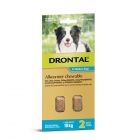
7 Common Worm Myths
Pet health is a crucial concern for pet parents, and understanding the truth about worms is a big part of that. Let's debunk some common myths and shed light on the facts:
1. Myth: Only Outdoor Pets Get Worms
Just a heads up, keeping your pet indoors doesn't mean they're safe from worms. These little critters can hitch a ride inside on your shoes or even with fleas. So, regular deworming is a must-do, indoor lifestyle or not.
2. Myth: Pets With Worms Always Show Symptoms
Here's the thing – your pet might have worms and not show it. They're pretty good at flying under the radar, especially early on. That's why it's a smart move to pop into the vet's for regular check-ups and those all-important poo tests.
3. Myth: Worms Can't Be Transmitted to Humans
Yep, it's a thing. Some worms, like roundworms and hookworms, can make the leap to humans through simple things like touching contaminated soil or pet poo. If humans get mixed up with them, it can lead to some pretty icky health problems, like worms travelling around your insides. Keeping clean and staying on top of your pet's deworming can help keep everyone safe.
4. Myth: A Single Deworming Treatment Is Always Enough
Dealing with worms can be a bit like a bad movie sequel—just when you think they're gone, they can come back. That's because of their life cycle – you might zap the adults, but their eggs can hatch later. Stick to the deworming schedule your vet suggests to make sure you've got it covered.
5. Myth: Heartworm Prevention Isn't Needed All Year
Heartworms are bad news, and they're not just a summer worry. Mosquitoes carrying these pests can be around any time, so keeping up with prevention all year is the way to go. It's all about keeping your beloved pet safe from these harmful parasites.
6. Myth: You Can Always See Worms in Your Pet's Stool If They're Infected
Just because you can't see them, doesn't mean they're not there. Lots of worm eggs are too tiny to spot with the naked eye. That's where your vet comes in with their trusty microscope, making those faecal exams super important.
7. Myth: You Can't Get Tapeworms from Flea Infestations
Fleas are more than just a nuisance; they can be a ticket for tapeworms to enter your pet's system. When your pet grooms themselves, they might accidentally swallow a flea that's carrying tapeworm larvae. Once inside your pet, these larvae can grow into adult tapeworms. That's why keeping fleas at bay isn't just about stopping those itchy bites; it's also a crucial step in preventing tapeworm infections. Regular flea treatment and control measures are essential to keep these unwanted guests away from your pets.
Preventive Tips to Keep Worms at Bay
Regular Deworming: Stick to the deworming schedule recommended by your vet. It's one of the simplest yet most effective ways to keep worms away.
Flea Control: Since fleas can carry tapeworm larvae, keeping fleas off your pet is crucial. Use vet-recommended flea treatments regularly.
Clean Living Spaces: Regularly clean your pet's bedding, toys, and the areas where they spend most of their time. A clean environment minimises the risk of parasite infestation.
Watch Where They Wander: Be mindful of the places your pet explores. Avoid areas known to be high-risk for parasites, like heavily wooded areas or unkept parks.
Proper Nutrition: A well-balanced diet supports your pet's immune system, helping them fendoff parasites naturally.
Hygiene Practices: Always wash your hands after handling pets, especially if you've been in contact with their waste. Teach children to do the same.
Prompt Waste Disposal: Dispose of your pet's waste promptly and safely. This not only helps in keeping your environment clean but also reduces the risk of spreading parasites.
Regular Vet Check-ups: Even if your pet seems healthy, regular check-ups can catch issues before they become serious. Your vet can provide personalised advice based on your pet's health, lifestyle, and the local prevalence of different parasites.
By incorporating these tips into your routine, you're not just protecting your pet from worms but also contributing to the overall well-being and longevity of your beloved companion.



